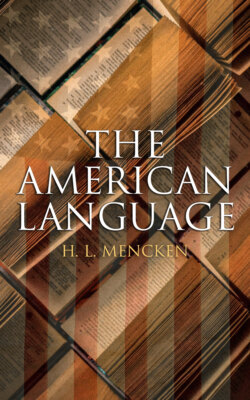Читать книгу The American Language - H. L. Mencken - Страница 7
На сайте Литреса книга снята с продажи.
§ 4
Foreign Observers
ОглавлениеTable of Contents
—What English and American laymen have thus observed has not escaped the notice of continental philologists. The first edition of Bartlett, published in 1848, brought forth a long and critical review in the Archiv für das Studium der neueren Sprachen und Literaturen by Prof. Felix Flügel,31 and in the successive volumes of the Archiv, down to our own day, there have been many valuable essays upon Americanisms, by such men as Herrig, Koehler and Koeppel. Various Dutch philologists, among them Barentz, Keijzer and Van der Voort, have also discussed the subject, and a work in French has been published by G. A. Barringer.32 That, even to the lay Continental, American and English now differ considerably, is demonstrated by the fact that many of the popular German Sprachführer appear in separate editions, Amerikanisch and Englisch. This is true of the "Metoula Sprachführer" published by Prof. F. Lanenscheidt33 and of the "Polyglott Kuntz" books.34 The American edition of the latter starts off with the doctrine that "Jeder, der nach Nord-Amerika oder Australien will, muss Englisch können," but a great many of the words and phrases that appear in its examples would be unintelligible to many Englishmen—e. g., free-lunch, real-estate agent, buckwheat, corn (for maize), conductor, pop-corn and drug-store—and a number of others would suggest false meanings or otherwise puzzle—e. g., napkin, saloon, wash-stand, water-pitcher and apple-pie.35 To these pedagogical examples must be added that of Baedeker, of guide-book celebrity. In his guide-book to the United States, prepared for Englishmen, he is at pains to explain the meaning of various American words and phrases.
A philologist of Scandinavian extraction, Elias Molee, has gone so far as to argue that the acquisition of correct English, to a people grown so mongrel in blood as the Americans, has become a useless burden. In place of it he proposes a mixed tongue, based on English, but admitting various elements from the other Germanic languages. His grammar, however, is so much more complex than that of English that most Americans would probably find his artificial "American" very difficult of acquirement. At all events it has made no progress.36
